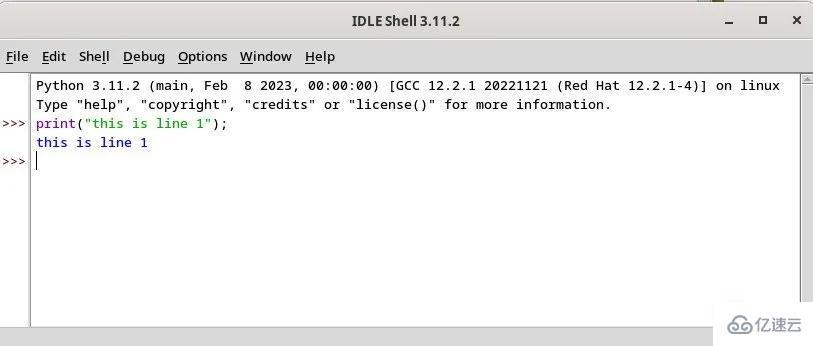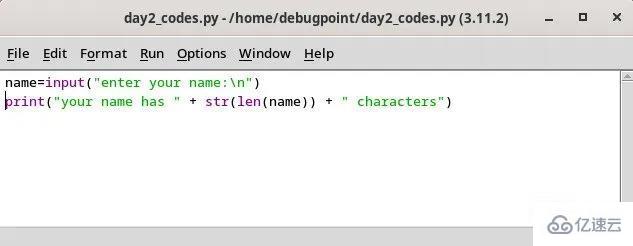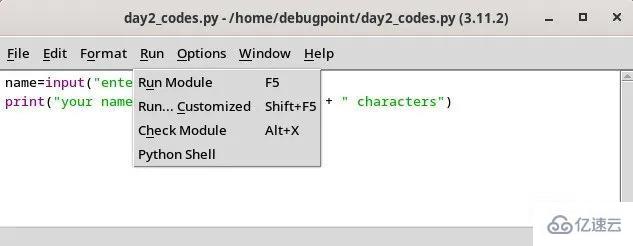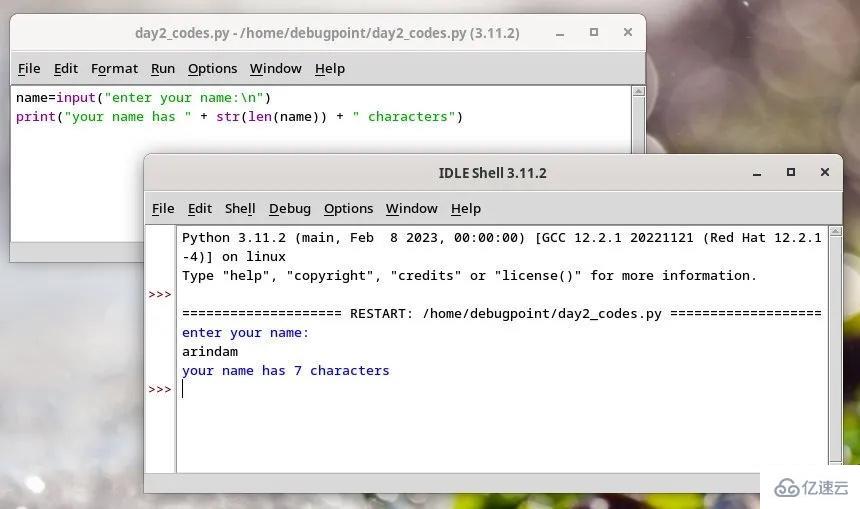 Operation and Maintenance
Operation and Maintenance
 Linux Operation and Maintenance
Linux Operation and Maintenance
 How to install IDLE Python IDE under Ubuntu and other Linux
How to install IDLE Python IDE under Ubuntu and other Linux
How to install IDLE Python IDE under Ubuntu and other Linux
IDLE (Integrated Development Learning Environment Integrated Development and Learning Environment) is a Python The IDE, written in the Python language itself, is usually installed as part of the Python installation on Windows. It's ideal for beginners and is simple to use. For those who are learning Python, such as students, it serves as a great IDE to get started.
Basic features such as syntax highlighting, smart recognition, and auto-completion are some of the features of this IDE. You can always learn more about IDLE's features in the official documentation.
IDLE in Ubuntu and other Linux
All Linux distributions including Ubuntu come with Python installed. Even if you manually upgrade or install the Python version, the IDLE integrated development environment does not come installed. You must install it manually.
For Debian, Ubuntu, Linux Mint and related distributions, open a terminal and run the following command to install IDLE:
sudo apt update
<div class="code" style="position:relative; padding:0px; margin:0px;"><pre class='brush:php;toolbar:false;'>sudo apt install idle3</pre><div class="contentsignin">Copy after login</div></div><p>When the command When asked if you want to install IDLE, enter <code>Yes. Once the command completes, IDLE will be installed on your Ubuntu system. For Fedora, RHEL, CentOS, use the following command to install it:
sudo dnf update
<div class="code" style="position:relative; padding:0px; margin:0px;"><pre class='brush:php;toolbar:false;'>sudo dnf install idle3</pre><div class="contentsignin">Copy after login</div></div><p><strong>Arch Linux</strong> User You can use the following command to install: </p><div class="code" style="position:relative; padding:0px; margin:0px;"><pre class='brush:php;toolbar:false;'>sudo pacman -S python tk</pre><div class="contentsignin">Copy after login</div></div><p><img src="/static/imghw/default1.png" data-src="https://img.php.cn/upload/article/000/887/227/168483776170592.jpg" class="lazy" alt="怎么在Ubuntu和其他Linux下安装IDLE Python IDE" /></p><p><em>Installation and running of IDLE in Ubuntu</em></p><h4 id="Start-IDLE-and-write-a-test-program">Start IDLE and write a test program</h4><p>After installation in Ubuntu, Debian, Linux Mint and Fedora, you can find the IDLE icon in the application menu. See the picture below: </p><p><img src="/static/imghw/default1.png" data-src="https://img.php.cn/upload/article/000/887/227/168483776251366.jpg" class="lazy" alt="怎么在Ubuntu和其他Linux下安装IDLE Python IDE" /></p><p><em>IDLE icon in the application menu</em></p><p>If you are using Arch Linux, you need to Run the following to start IDLE: </p><div class="code" style="position:relative; padding:0px; margin:0px;"><pre class='brush:php;toolbar:false;'>idle</pre><div class="contentsignin">Copy after login</div></div><p>After starting IDLE, you should see the main window as shown below: </p>
<p><img src="/static/imghw/default1.png" data-src="https://img.php.cn/upload/article/000/887/227/168483776251147.jpg" class="lazy" alt="怎么在Ubuntu和其他Linux下安装IDLE Python IDE"></p>
<p><em>IDLE Editor main window</em></p>
<p>By default, it displays an interactive interface Shell, and you can execute Python code directly in each line. It works like any shell interpreter. And when you hit the enter key, you will get the output, and there are three <code>> symbols to go to the next line and execute the next command.

Run a simple Python statement in IDLE
IDLE also allows you to open any .py from its file menu document. It will open the file in a separate window where you can make modifications and run it directly. You can run it using F5 or from the option "Run > Run Module".

A Python file opened from IDLE

Run using the menu The file's options
output will be displayed in a separate output window. You can debug in the output window, view stack traces and other options to step into a specific line or file.

The output is displayed in a separate output window in IDLE
The above is the detailed content of How to install IDLE Python IDE under Ubuntu and other Linux. For more information, please follow other related articles on the PHP Chinese website!

Hot AI Tools

Undresser.AI Undress
AI-powered app for creating realistic nude photos

AI Clothes Remover
Online AI tool for removing clothes from photos.

Undress AI Tool
Undress images for free

Clothoff.io
AI clothes remover

Video Face Swap
Swap faces in any video effortlessly with our completely free AI face swap tool!

Hot Article

Hot Tools

Notepad++7.3.1
Easy-to-use and free code editor

SublimeText3 Chinese version
Chinese version, very easy to use

Zend Studio 13.0.1
Powerful PHP integrated development environment

Dreamweaver CS6
Visual web development tools

SublimeText3 Mac version
God-level code editing software (SublimeText3)

Hot Topics
 1664
1664
 14
14
 1423
1423
 52
52
 1318
1318
 25
25
 1269
1269
 29
29
 1248
1248
 24
24
 Linux Architecture: Unveiling the 5 Basic Components
Apr 20, 2025 am 12:04 AM
Linux Architecture: Unveiling the 5 Basic Components
Apr 20, 2025 am 12:04 AM
The five basic components of the Linux system are: 1. Kernel, 2. System library, 3. System utilities, 4. Graphical user interface, 5. Applications. The kernel manages hardware resources, the system library provides precompiled functions, system utilities are used for system management, the GUI provides visual interaction, and applications use these components to implement functions.
 How to check the warehouse address of git
Apr 17, 2025 pm 01:54 PM
How to check the warehouse address of git
Apr 17, 2025 pm 01:54 PM
To view the Git repository address, perform the following steps: 1. Open the command line and navigate to the repository directory; 2. Run the "git remote -v" command; 3. View the repository name in the output and its corresponding address.
 vscode Previous Next Shortcut Key
Apr 15, 2025 pm 10:51 PM
vscode Previous Next Shortcut Key
Apr 15, 2025 pm 10:51 PM
VS Code One-step/Next step shortcut key usage: One-step (backward): Windows/Linux: Ctrl ←; macOS: Cmd ←Next step (forward): Windows/Linux: Ctrl →; macOS: Cmd →
 How to run java code in notepad
Apr 16, 2025 pm 07:39 PM
How to run java code in notepad
Apr 16, 2025 pm 07:39 PM
Although Notepad cannot run Java code directly, it can be achieved by using other tools: using the command line compiler (javac) to generate a bytecode file (filename.class). Use the Java interpreter (java) to interpret bytecode, execute the code, and output the result.
 How to run sublime after writing the code
Apr 16, 2025 am 08:51 AM
How to run sublime after writing the code
Apr 16, 2025 am 08:51 AM
There are six ways to run code in Sublime: through hotkeys, menus, build systems, command lines, set default build systems, and custom build commands, and run individual files/projects by right-clicking on projects/files. The build system availability depends on the installation of Sublime Text.
 What is the main purpose of Linux?
Apr 16, 2025 am 12:19 AM
What is the main purpose of Linux?
Apr 16, 2025 am 12:19 AM
The main uses of Linux include: 1. Server operating system, 2. Embedded system, 3. Desktop operating system, 4. Development and testing environment. Linux excels in these areas, providing stability, security and efficient development tools.
 laravel installation code
Apr 18, 2025 pm 12:30 PM
laravel installation code
Apr 18, 2025 pm 12:30 PM
To install Laravel, follow these steps in sequence: Install Composer (for macOS/Linux and Windows) Install Laravel Installer Create a new project Start Service Access Application (URL: http://127.0.0.1:8000) Set up the database connection (if required)
 git software installation
Apr 17, 2025 am 11:57 AM
git software installation
Apr 17, 2025 am 11:57 AM
Installing Git software includes the following steps: Download the installation package and run the installation package to verify the installation configuration Git installation Git Bash (Windows only)



